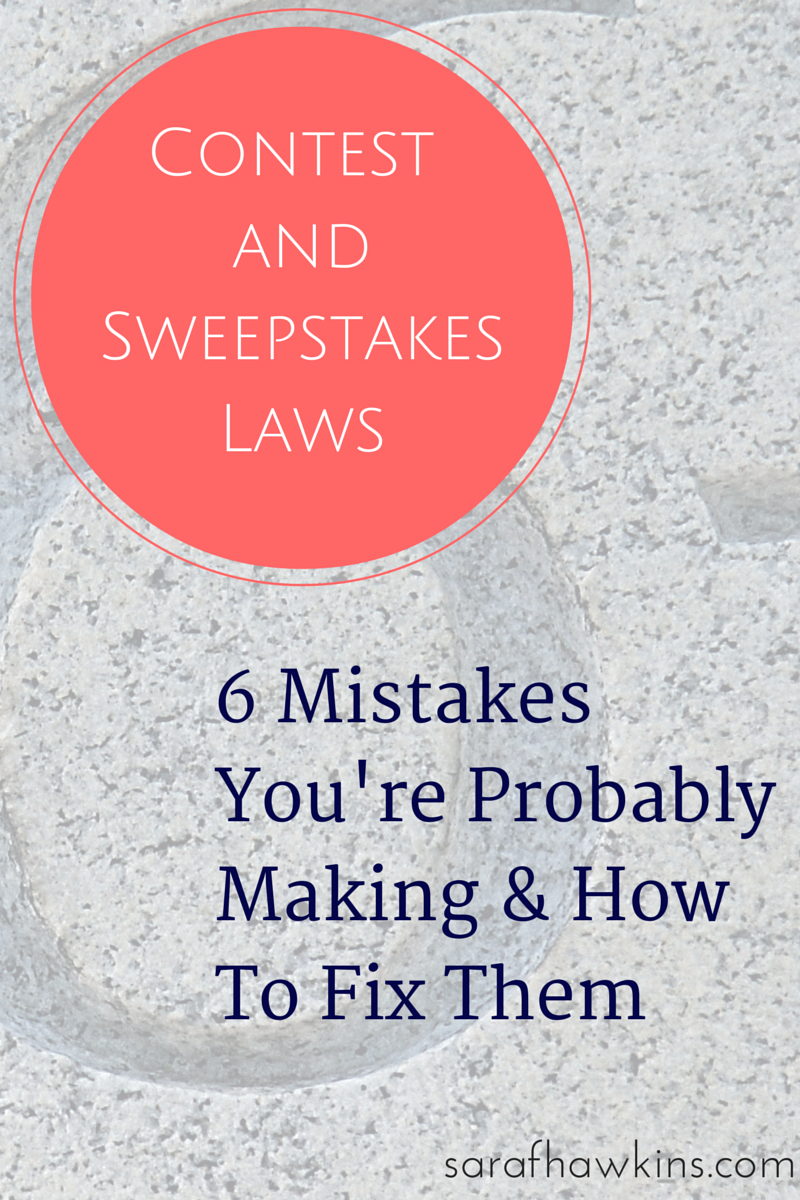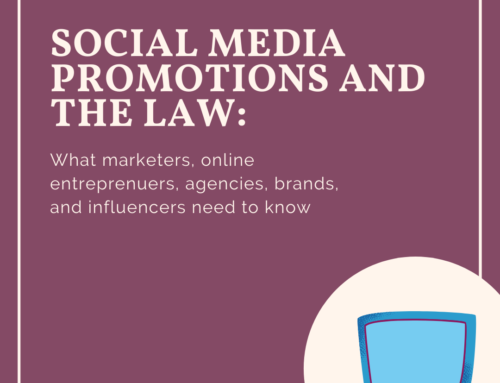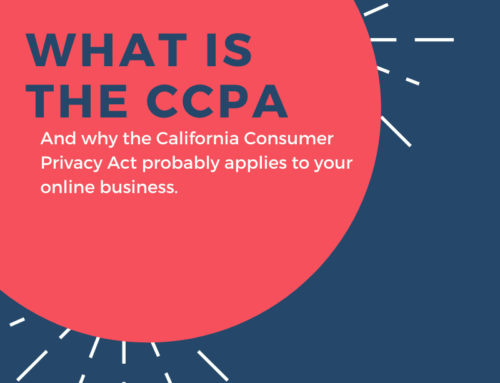Contests and sweepstakes are powerful marketing tools. Whether it’s a blog, website, or social network there is no shortage of people or businesses wanting to give things away to their community. And why not, people like to win free stuff. But contests and sweepstakes law is also important to be aware of, too.
When it comes to giving things away and asking people to enter in some way so you can choose a winner or two you’re crossing the line from pure marketing into the legal realm. This is where problems can arise. There are a host of marketing and business concerns that blur lines with state and federal law and regulations. Advertising guidelines for promoting certain products establish parameters that need compliance. Truth-in-advertising regulations apply to every marketing promotion. So it should come as no surprise that you should also be asking is your giveaway legal.
There are a number of reasons why giveaways could run afoul of the various contests and sweepstakes laws. I see them every day both as an attorney and as a consumer. And it’s not just small businesses that have problems with the contests and sweepstakes laws. I’ve seen major companies run promotions that would easily open them up to significant liability. So I want to share with you information you can put into action to help improve the chances that your promotion will not expose you, your clients, or your business to greater liability.
6 Mistakes You’re Probably Making With Your Contest or Sweepstakes and How To Fix Them
1. No Official Rules. Unfortunately, the laws related to sweepstakes and contests don’t care that you’re just trying to be nice and give back to your community. These laws were written long before the internet was more than just a place to illegally download music. As a matter of fact, few laws related to consumer promotions have been updated to account for the advances in technology.
This has left the courts to decide what some of the words mean with regard to technology. I’m sure that whenever you play a game you want to know the rules. It’s basic kids’ stuff, really. Without rules how do you know who wins? Without rules, what happens when someone cheats? It’s nice to think that everything will go right.
Official Rules aren’t really there for when things go right, they’re there for when things go wrong. If you do not have Official Rules you open yourself up to liability if someone doesn’t win but thinks they should have.
How to fix it: Create Official Rules. Ultimately, you should work with an attorney who specializes in this area and not just cut and paste things off the internet.
2. Changing the Official Rules after the promotion begins. Don’t do it! Remember when you were a kid and you thought you were winning only to find out that the rules were changed after you started? Not only is changing the rules often illegal, or, at the very least, a violation of consumer protection rules, consumers (and your competitors) see it as unethical and can expose you for not being on the up-and-up.
If your promotion is one where you have had to file a bond, changing the rules is a violation not only of the contests and sweepstakes laws but also of the bonding regulations which often include very high penalties and fines for making changes after application for the bond. Are there exceptions? Sure there are. But the exceptions are very limited and are usually reserved to issues where there are material errors in the rules (such as all the marketing offers a prize of $500 but the Official Rules show $5,000) or where there is a situation that is compromising the integrity of the promotion (such as use of bots to enter, hacking, etc.).
How to fix it: Once the promotion begins, don’t change the rules! If you are in a situation where you think you need to change the rules, consult an attorney and ensure you have the law on your side if you were to be sued. Even if you don’t get sued, the public relations fallout could be harsh.
3. Not knowing the difference between a sweepstakes, a contest, and a lottery. It may not seem like a big deal, and from a marketing standpoint it probably isn’t. From a marketing standpoint it seems that the words giveaway, promotion, sweepstakes, and contest all mean the same thing and are often used interchangeably. When it comes to the law, though, these words have very specific meanings, especially when it comes to running consumer promotions in multiple countries.
How to fix it: There are 3 words related to consumer promotions that have legal meaning. These need to be used correctly because they dictate how you choose the winner and how your promotion is structured. Know the difference between a sweepstakes (winner chosen at random), a contest (winner chosen based on skill), and lottery (highly regulated game of chance that is illegal in most states except in certain instances).
Giveaway and promotion do not have legal definitions. It may not seem like a big deal to interchange the words sweepstakes and contest, but since they have different legal meanings it could create confusion for entrants or result in your not running your promotion in a legally compliant manner. Keep in mind that some countries may have different meanings for these same words, making it even more difficult to run your promotion on an international scale.
4. Not understanding what “No Purchase Necessary” really means. Most people read this in a literal sense of having to actually pay money for something to earn an entry. This three-word phrase confuses many people. When it was first included in sweepstakes laws the meaning did relate to requiring entrants to have to buy something to obtain an entry. Note that I used the word sweepstakes and did not include contest. This distinction is important because the “no purchase necessary” requirement is not universal for all consumer promotions.
Over the years courts have had to interpret what “no purchase necessary” means and have expanded it to mean consideration. Unfortunately, there are few cases that set out exactly what is and is not deemed consideration. Obviously, money (cash or cash equivalent) is consideration. But what about all the other things – Likes, Tweets, Pins, shares, comments, subscriptions, – that are valuable to online marketers? We don’t have guidance from courts at this point but what we do know is that consideration is a very broadly defined word and each of the 50 states has their own definition.
In 2011 the U.S. District Court for Central California took on a case involving this matter with regard to the voting mechanism on “America’s Got Talent”. Although the class action was settled, there was no case law that came out to further define this aspect of the law. And while having some way to submit a “free” entry is great, how you make it known is equally as important. While you may think no one is really paying attention, indeed they are and in 2013 the A&P grocery chain agreed to pay $102,000 in fines for burying its “free” entry in the rules.
How to fix it: Always have a method of entry for your sweepstakes that does not require the entrant to exercise more than minimal effort, is not an action that confers economic value, and is easy to find in your rules. Keep in mind that what you consider to be minimal effort may not be what consumers deem minimal and that courts may ultimately find your required action confers a economic value to your organization or one with which you have a material relationship.
5. Giving different types of entry more value than others. While there are no specific state laws or cases to cite where there is explicit language about this concept of “Equal Dignity“, it is through a collection of cases where courts have ruled on various aspects of sweepstakes administration that we get this idea of equal treatment for entries and prize winning.
This stems from promotions in years’ past where those who purchased a product had a greater likelihood of winning than those who did not make a purchase. Known as “entry dignity”, this is one of the top mistakes I see with online promotions. Many use a third-party widget or app which allows for various entry methods to be given different point values for entries. Just because the third-party platform allows this doesn’t mean it is legal. And don’t expect the third-party platform to cough up the money if you are sued or fined, because you’ve likely released them from any liability in the terms of service (which many don’t take the time to read).
How to fix it: Give all entry methods and the opportunity to win the stated prizes the same chance of winning, regardless of what the entrant had to do to enter. You may really want people to sign up for your newsletter or comment or Pin or share but you can not give them more entries, and thus a greater chance of winning, for doing those things than if an entrant just fills out a basic form. In addition, you can not limit who gets to win any particular prize to those who take certain action.
6. Allowing anyone to enter. This may seem strange, but your promotion can not be open to everyone. With online promotions this is especially troublesome for US-based influencers, businesses, and websites because it often means excluding non-US residents. I often see comments from Canadians who are upset because they can’t enter.
But, the fact is if you are going to open up your promotion to entrants who reside in other countries you need to comply with the contests and sweepstakes laws of those countries. For Canada this means understanding their laws for contests as well as meeting requirements for opting in to email communications as well as complying with the language requirement for residents of Quebec.
In addition, if your promotion is open to anyone, there are US (and other jurisdictions) laws regarding advertising to minors (in the US it’s handled by COPPA), rules pertaining to minimum age for checking into hotels, renting a car, or attending an event where alcohol may be served, and other legal considerations you must consider based on the prize, industry, or entry methods.
How to fix it: Only allow those residents of jurisdictions where you know for certain you can comply with the law. Understand the laws related to marketing to children under 13 if your promotion is targeted to that group. Realize that prizes you choose may limit who can win. It’s great that you want to include everyone, but it’s important to understand that there are significant consequences if you can’t comply with all the laws needed to do so.
Running a sweepstakes or contest takes more than just creating a fun way to give away prizes to your customer or readers. Engaging with your customers and trying to attract news ones is an important part of marketing. But the legal issues related to consumer promotions are a significant consideration as well. While it may seem like no one is watching, the reality is that there are people who are watching. Like many laws, not everyone gets caught when they do something wrong. However, that’s not a reason to turn a blind eye to the law. And, honestly, it’s very easy to fix each of these problem areas. Ultimately, though, if you can’t afford to do it right, ask yourself if you can afford to do it wrong. Contests and sweepstakes law
If you are planning a contest or sweepstakes and need legal assistance, I may be able to assist you.
If you found this article informative, take a look at my other articles about copyright, trademark, and social media. If you’d like to discuss this topic further, please contact me or connect with me on Twitter or LinkedIn.







[…] bloggers, social media managers, and community managers this is important legal information about the legalities surrounding contests and sweepstakes from Sara F. […]
[…] Sara Hawkins explains, “Not only is changing the rules often illegal, or, at the very least, a violation […]
Thank you for all of this information on running a sweepstakes/giveaways. I am finding it very useful and written in a way that it is easy to understand. I am a blogger that is about to do a giveaway hosted by myself and not business or brand. So I have been reading up about it all. 🙂
Sara,
Again, thank you for sharing your expertise so generously.
With reference to Equal Dignity, You say:
“How to fix it: Give all entry methods and the opportunity to win the stated prizes the same chance of winning, regardless of what the entrant had to do to enter. You may really want people to sign up for your newsletter or comment or Pin or share but you can not give them more entries, and thus a greater chance of winning, for doing those things than if an entrant just fills out a basic form. In addition, you can not limit who gets to win any particular prize to those who take certain action.”
So, specifically, what if entrant gets 1 point for entering the initial draw, which includes subscription to a newsletter, and 1point each time for sharing the draw via 3 other social media or emails, would that violate the concept of Equal dignity? Each time the person shares in any way, they accumulate additional entries; thus one entrant may have accumulated 3 entries and another only 1. The draw is random amongst all entries. No method of entry gains more entries, but the more methods used to enter, the more entries the person has in the draw. Would that violate Equal dignity?
Thanks so much,
gerry
Thanks for the question, Gerry. Equal Dignity is measured for each individual entry, not in the aggregate. Just because someone can get 10 entries if they Tweet 10 times, they still only get 1 entry per tweet. Every method of entry would have to be 1 entry. The newsletter sign-up can’t give 10 entries because someone has the option to tweet 10 times. Equal Dignity in sweepstakes doesn’t work that way. Just because it’s a more valuable method for the sponsor doesn’t mean they get to give more value to it in the sweepstakes.
Sara,
Thanks a lot – that clarifies much and is completely managable within our prize draw system. Allow me one followup re “consideration” about which I posted elsewhere but which, for technical reasons, never made it to you.
Sounds like we are in good shape as long as each entry method is worth the same amount of entries as any other.
The aim of our system is to promote the brand of a business. When 1 person enters the draw initially, they are informed that they will be receiving a newsletter each month, from which they may unsubscribe at any time, detailing monthly special offers of one kind or another. Each newsletter will also promote the following month’s prize draw as well. Do you see any problem with that?
Also, just read a message on one of your other blog entries: On March 19, 2016, you wrote: “The FTC disclosure guidelines would not necessarily apply with a simple share. However, if there is a link or action whereby the original sharer would obtain additional entries if someone takes those additional actions it may require appropriate disclosure.”
Our prize draw is designed so that people who share DO receive another entry if someone who has seen their share on social media ALSO enters the prize draw in the same way. Entrants are informed of this. Disclosure of this is part of the system in order to encourage the sharing, enabling the prize draw to “go viral.” Any issues there?
Any problem with the newsletter subscription process as I have described it?
We do realize that we must publish and disclose all the rules, etc.
My question about “consideration” seems never to have been posted to another of your blogs, so I’ll post below the remaining question I have re “consideration” hoping it posts here so you can answer it publically.
Thanks so much again for your generous assistance,
gerry
Unfortunately, I can’t tell if you something is ‘OK’ since that could be construed as dispensing legal advice. What I can tell you is that it’s unclear if newsletter subscriptions are or are not deemed consideration within the scope of sweepstakes and/or contest laws. Certainly each newsletter subscriber is valuable; however, without a court or regulatory ruling or legislative indication it’s anyone’s guess if a newsletter subscription required entry would be classified as consideration.
Sara,
Thanks again for your helpful thoughts. I’ll revise our prize draw to handle the Equal Dignity question by giving each method equal value in entering the prize draw and for now not worry about the consideration question. May use double-optin for newsletter, though to steer clear of CAN-SPAM rules in US.
Cheers,
gerry
Sara,
First, how generous of you to maintain this valuable blog. I’ve read almost everything here, especially about consideration, and now Equal Dignity, and I’m still a bit confused for my particular situation.
I’m considering (no pun intended) using a method taught by a fellow in England. I live in CA but could market this elsewhere in US if legal.
The intent is generate more newsletter subscribers for a given business, whereby they might communicate specials, etc. to their subscribers, e.g., a discount for coming in to dine midweek.
In order to do so, the business sponsors a prize draw – in the case of a restaurant, a meal for two – wherein responders, some of whom may already be on the business’s email list, gain additional entries for sharing on Facebook, twitter, etc. Based on your previous responses to me and others, it appears these need to be of equal value based on the principal of “Equal Dignity.” No problem.
At the end of the draw period, a winner is chosen randomly from the pool of entries. One person might have 6 entries, another 4, etc. The method of choosing is called a weighted draw, i.e., weighted draw: every point earned by sharing is treated as a single entry, so person with 20 share points has 20 chances. Draw will be random among the entries.
Entrants are informed, along with all the other applicable rules, that they will be subscribed to the newsletter: “When you enter you will also be subscribed to the XYZ Client email newsletter which includes news and special offers from XYZ Client. Your email address is never shared with anyone else and you can unsubscribe at any time.”
So, bottomline, is this legal as you understand it, especially with regard to consideration?
I can tell you that instructor/developer of this service has been asked about legality in various countries and has referred students to
wherein page 65, re California, states: “Prize draws in which there is an element of chance and a prize is awarded are generally permitted, but to avoid being an illegal lottery participants should not be required to provide any consideration to take part. Consideration can be found if payment, purchase, or a “substantial expenditure of effort” is required.’
The instructor refers to that and states:
“Personally I’d say that completing a box with name and email address is not substantial effort but everyone should do their own research of course.”
Does that help? Is the newsletter signup a “consideration?” And is it really? The recipient may unsub at any time.
The instructor doesn’t use the following method and I wonder if it would avoid a consideration issue. What if, upon entry, and even after being informed of subscription, respondent receives a double-optin email. If respondent subscribes then even more voluntarily, would that be ok, and would double-optin even be necessary as he/she has already been clearly informed.???
I have alternative slant for you to consider: In the method described above, the main offer is to enter a prize draw, by which you will be subscribed to the newsletter.
What if we turn this around, offering clearly: Subscribe to our newsletter and and gain an entry to our prize draw of such an such a prize, e.g., dinner for two, coupon for $100 worth of merch in our shop, etc. You can gain additional entries by sharing our prize draw offer on Facebook, twitter, etc. (we provide buttons making this easy to do using Upviral software (dutch company but also available in US for running “viral” contests, draws, etc.)
I hope I have explained this well enough and hope either method is a legal sweepstakes, as I agree with the instructor of the method, In England, has found it very successful in increasing the email lists of, mainly, restaurants so they can offer specials to newsletter subscribers, etc. increasing revenue, and making subscribers happy by gaining either a free meal or offers for midweek specials. It is simple, viral email marketing that really hurts no one. A subscriber may unsub at any time.
Again, Thanks so much for so generously offering your advice and commentary.
gerry
Traditional definitions of Consideration, specifically with regard to sweepstakes and contests, have been slow to update. As such, it’s not clear if requiring an entrant to subscribe to a newsletter would be consideration. Clearly, a newsletter subscriber has value. However, without further information from a court or regulatory body it’s unclear if it could withstand challenge. Also, in those instances where an entrant is auto-subscribed to a newsletter there are SPAM issues and those vary by country.
My question has to do with a company deciding to do a giveaway but it is not doing any type of promotion. The company will simply randomly select an online order on a daily basis and give that customer his/her order for free. Would this be governed by the sweepstakes/lottery laws?
Without knowing more, it’s difficult to say if the promotion would fall under sweepstakes/laws. ‘Surprise and Delight’ promotions (that’s the name I give them), where companies want to randomly reward customer, are quite common. There should be, at minimum, an internal protocol for these type of promotions. If the promotion is used as a marketing tactic and promoted online as a type of ‘prize’ further considerations should be made to be compliant beyond standard marketing and advertising regulations.
I read somewhere (and of course I can’t find it now) that if you are giving away a credit to your business it can’t be of lesser value than your lowest priced item, which would require the winner to then put out money in order to use what is being given to them. Is this true, or partly true, or completely made up?
Thanks!
Maggie
Hi Maggie,
There are no specific laws or regulations that dictate the minimum value of a prize. However, if the prize value is so low that it would require the winner to pay to actually use the prize there are laws and regulations regarding that. If a prize winner gets a $10 gift card and the cheapest thing in the shop is $15, consumer protection laws would likely find problems with this. Same goes with the winner having to pay shipping/handling to obtain their prize. However, there are many businesses that have prizes that would have a significantly lower value than anything they sell. For example a travel company can give away a camera or luggage worth $300 even if their cheapest tour package is $1,500. Now, if they gave away a $500 voucher that would be a problem.
lets say i give away one 1 entry to every 10 people that sign up for the contest. I then say for every 5 sales i make I will put up one prize to giveaway. if i make 10 sales i giveaway 2 etc…. is there liability in this type of sweepstakes?
There are too many unknowns to even begin to give any information It’s not even clear that your promotion would be a sweepstakes. You definitely need to either do more research or speak with an attorney about your specific promotion.
On September 7, 2017, the television network AMC posted a huge online contest via various social media platforms (FB, Twitter, Instagram) called ‘We are the Walking Dead contest’ for their hit show The Walking Dead. It is part of their celebration of the show’s upcoming 100th episode. There are offering 10 grand prize packages that all include a trip to LA, pix with cast, etc.
From the start, it appears there were errors made in the eligibility and rules areas of the public posting. The crux of the matter is that Canadians were originally permitted to enter – as they have been in their previous contests – but it appears have since been removed. This is verifiable at least partly through posts on these various sites (many of which I’ve now copied) of people complaining about multiple discrepancies. Noting, for example, one missing province (Quebec which is considered separate IS most Canadian contests so not necessarily an error, per se), to them initially writing, “Open to residents of the United States OF Canada” instead of ‘OR Canada’. Clearly, an error.
When I first checked via their own post/link on my FB feed, we were eligible and all provinces (save for Quebec) were options. Moreover, Canada was clearly specified under the full ‘eligibility’ section. This has since been, as of today/current, removed. Unfortunately, I have now spent two weeks time away from most other work, creating a sculpture for this contest, for which I have also invested money. First time I ever bothered with such a thing, and likely now, last. Also quite the way for the network to kill my enjoyment of my favorite show ever.
It just happened that I checked back into their site today to verify again the breakdown in judging criteria (percentage of creativity vs. knowledge of show, etc.) only to find this infuriating mess. I’m wondering what recourse I might have or the best way to approach this matter? Really, I just want to enter and have a fair shake, but if not, wonder if there are any ramifications for the network, whether just for me, and/or potentially many others in similar circumstances, or is anyone responsible in anyway legally for making such errors, apparently ongoing over the course of multiple days, and perhaps as recently/ongoing as of September 18? Thank-you.
I don’t know what transpired to cause them to change the rules. Rarely do major sponsors modify rules after a promotion begins, and if they do they usually explain why. If you believe the law has been violated, you should contact your consumer protection bureau in your province. I can understand your frustration and I appreciate you sharing it here. However, the provincial authorities would be the best option to report any irregularities.
I was wondering about contests that charge points to enter. In specific, I’m looking at Cinemark theaters. They have a reward program where you earn points for purchases. You can turn them in for discounts on concessions, movie memorabilia, and often also on sweepstakes.
here are the official rules for one of these, but they do not accurately describe the process. In addition to filling out the form in one of the two noted ways, you must also spend your reward points.
That doesn’t sound right. There is no alternative means of entry, either.
https://www.cinemark.com/bumblebeesweepstakes
You would need to read the official rules for every sweepstakes and follow the rules for the non-app form of entry. Often companies will provide for a mail-in or online form completion as the form of entry to satisfy the ‘no purchase necessary’ requirement.
Hello. I have a question. If a company runs a promotion and is saying they will be having a random drawing at the end on a certain date, and they keep pushing the date Firth and further into the future (6 months in this case, is there any legal action participants can take against the company? The giveaway is a single product that is worth several thousands of dollars. Participants were required to post YouTube videos tagging the business.
You would have to read the Official Rules and determine if they are allowed to change that date. If the date is changed and it is a consumer sweepstakes that required registration in NY/FL it may be a violation if the new dates are not updated with the states.
Hi Sara. So glad I found you. My question is about the operators of sweepstakes sites. I am aware of a site where the operator seems to enter the contest, then posts the link he gets after entering when doing so allows him to get more entries for himself. There are a lot of visitors to his site which can add up to lots of entries for him which gives him higher chances of winning. He does not tell his customers he does this. For me this is unethical and cheating his customers. Is it legal for him to do this? Thanks for any help you can provide.
If the person is posting their own referral link, that should be disclosed if for no other reason than being transparent. According to the FTC Endorsement Guides, that may call for disclosure thought that specific scenario is not addressed. It may not be illegal (unless the FTC Endorsement Guides would apply), but it’s not totally aboveboard either.
Hi Sara,
Thank you for this informative blog. SBA in San Francisco have referred me to your blog. I am planning to have a skill based competition in my company’s social media accounts, where a contestant earns a point based on the level of difficulty of the question. At the end of the year-end of the competition, a book as prize will be given away to the top scorer. Am i violating any laws in this short description. I can also share with you the complete mechanics , please let me know.
Thanks and hope to hear from you soon!
Regards,
Michael Espina
Your question is beyond the scope of the comments section. We provide legal advice to clients with regard to marketing promotions of all types. Just because you think your promotion is ‘skill based’ you will want to confirm that with knowledgeable legal counsel because states have different ways of determining if a promotion is actually skill-based.
Sara,
I’m curious if someone were to hold a random giveaway to three participants who complete an online survey, anticipated to take about 20 minutes, as part of a dissertation project, if there would be legal considerations.
Thank you so much for providing this valuable information!
Of course there would be legal considerations, which is why you’re likely asking the question. It seems that these public surveys for dissertation projects are becoming more commonplace. I see them much more frequently and the statistics student in me wonders about the statistical viability of the responses. With regard to the legal part, that’s actually more difficult because all sweepstakes must be legally compliant. Whether you get 3 or 3 million you’d still need to make your random drawing and award the prize. The issue becomes whether the 20 minutes to complete the survey is ‘consideration’. This would make a great hypothetical – how much time is required to be deemed consideration with regard to a sweepstakes. And, in this example, would there be some type of balancing of time vs. public good to determine that question. This is why people don’t ask lawyers or PhD(c) questions – because we can complicate even the most seemingly simple question.
University students often don’t fall under the same review scheme because the need to obtain valuable data is an important one. Providing an incentive, usually something small, is often needed because of the value placed on data significance.
Should you operate your sweepstakes in a legally compliant manner? Absolutely. But talk with your advisor to find out what the school’s policy and position are with regard to these.
Hi, Sara:
Hoping that you haven’t yet gotten this question.
Many official rules for sweeps contain a “publicity” section — language stating that winners, by accepting a prize, consent to the use of their likeness, image, quotes, etc. in marketing and promotion by the sweeps operator.
Is this provision enforceable? In other words, can a winner lawfully decline to allow such usage, but still receive the prize in question?
I ask, because, well, isn’t consent to allow such usage a kind of additional consideration, then?
Bonus round: Would this implied consent take the place of a release agreement?
Very good question, Dave. These clauses are often hard to challenge if the use of the name/likeness is minimal. It is advisable that winners always sign an affidavit so this type of consent is directly given and there is no doubt regarding their consent.
Could it be consideration? Not likely given that the rules require consent to many different concepts.